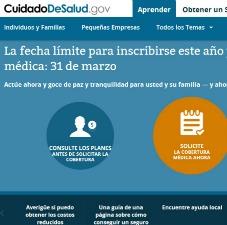BOB GARFIELD: Yurina Melara covers public health for the Los Angeles-based La Opinion, the largest Spanish language daily in the United States. She says that reaching the 38 million Spanish-speaking Americans with the message is only half the battle. The other half is being understood, beginning with the literal translation of “health care.”
YURINA MELARA: We can start with cuidado de salud. That could mean anything from taking a walk to having a healthy meal,
to having a nurse in your house –
BOB GARFIELD: Literally, it means care of health, right, but it’s not a term of art to describe insurance medical coverage.
YURINA MELARA: No, it’s not a term for medical insurance. What they’re doing is just translating literally, and that doesn’t really work when you’re trying to explain concepts that people are not familiar with, so – ‘cause health insurance is not something that it’s common in Latin America. We do have certain systems but it’s not the way it is here.
BOB GARFIELD: Complicating matters, Spanish is not a one-size-fits-all language. From Central America to South America, from the Caribbean to inland, there’s different idiom, different dialect.
YURINA MELARA: I think that’s where the work has to be. You can’t really translate something that is not in your culture. How do you explain to somebody that doesn’t know they need to pay monthly, you know, that that’s how it works here? The common word that I see used is “prima.” But where I’m from prima is the down payment. It’s not a monthly payment. It can also mean an award, you know, like a prize. How do they decide what to do with it? Do they go with the Mexican translation?
BOB GARFIELD: So what is the solution here? Should HealthCare.gov have different dialects for each of these regions?
YURINA MELARA: No. I know a lot of people are gonna hate me and they’re gonna say, oh my God, you ruined Spanish. But it’s common for immigrants that have been here a while to adopt other terminologies that are not common or used in their native region. So why not just go with it and say “Obamacare” instead “la Ley de Cuidado de Salud a Bajo Precio.” It’s super long and doesn’t make much sense. Or just call it “ACA.”
I think there needs to be some sort of common ground. Just to give you another example, when you’re talking about car insurance it’s very common between Latinos to say “aseguranza” That’s not a word in Spanish, but it’s so common that everybody just says asequranza, even though it doesn’t mean anything, but
they know what they’re talking about.
BOB GARFIELD: I guess you’ve been trying to explain some of these sometimes elusive concepts to your readers. Is your feeling that they’re being stymied by CuidadodeSalud.com?
YURINA MELARA: You know, I listen a lot to readers, so do they understand CuidadodeSalud.com? Do they go on there? No. They prefer to go to the community clinic. They really don’t like to go directly to the website.
BOB GARFIELD: Do you think it’s worse in translating health care terminology than maybe other beats in the newsroom? Is this such a jargon-filled enterprise that it, it makes your job harder than, say, perhaps the police reporter has to deal with?
YURINA MELARA: No, not really. I think every beat has their own challenges. For example, yes, I have my challenges on how to explain why the health insurances, but also the police beat, for example, we have the LAPD, the local police, and then we have the sheriff and then, you know, the story – how do you explain that, “No, it wasn’t the, the police, it was the sheriff”?
The people that cover government, we have city government, then we have county government, then we have state government and then the federal government, so many levels. So I think everybody has a challenge.
BOB GARFIELD: I’ve got one more thing for you. Let’s say you’re speaking to Kathleen Sebelius, the Secretary of Health and Human Services, what would you say to her about how to improve the interface between the Hispanic community and the government?
YURINA MELARA: I think the best way to reach out would be through work - community centers, community clinics, where people are, you know, through their communities. We come from a strong culture of asking questions and getting help, and we’re talking about a long form that people have to fill out with a lot of stuff that people are not used to that, they don’t deal with every day. I don’t think our website is gonna do it.
BOB GARFIELD: Yurina, thank you very much.
YURINA MELARA: You’re welcome. Nice talking to you.
BOB GARFIELD: Yurina Melara is a reporter for La Opinión.
